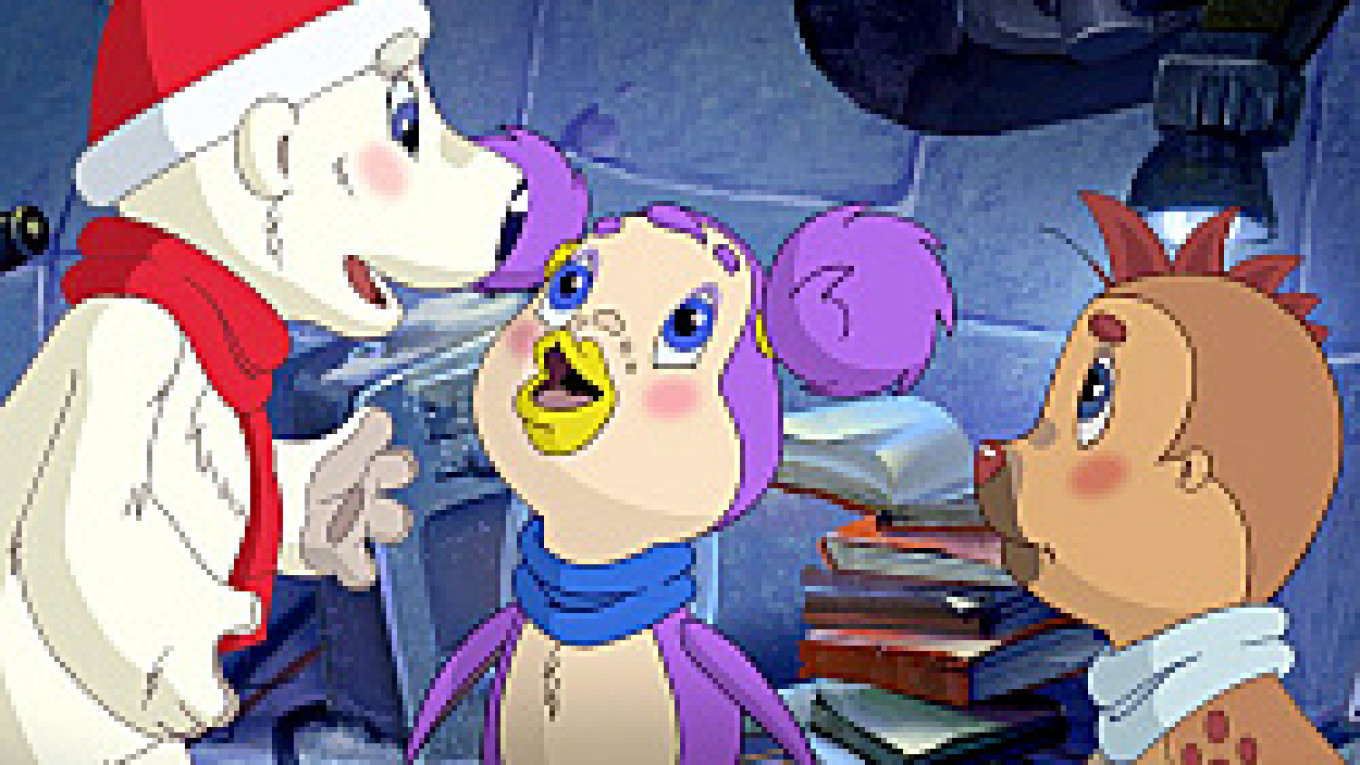"Elka," which opened Thursday, is one of very few Russian full-length cartoons that have enjoyed a wide release in cinemas. While the director says that the 85-minute family film by Tema Studio is about friendship, it has elements that could be construed as patriotic and anti-Western.
Elka is a polar bear with a red-and-white hat who lives in the Arctic; he discovers a "friendship tunnel" that is only visible to those capable of being friends. Peering through, Elka sees Tasha, a pig-tailed purple penguin, emerge from the Antarctic. Tasha tells him that a giant robot, Maxi Mouse, has hypnotized her parents with a brown fizzy drink, and all the ice from the Antarctic has been stolen to feed the robot. She warns that a similar fate awaits the Arctic if Elka does not stop the robot.
Children will miss the analogies with Disney and Coca-Cola, but Sakov said that even for adults, the film is not intended to carry an anti-American message. "The film is about friendship. It's a play on Soviet times, when everyone was scared of the West --represented by Maxi Mouse -- but he turns out just to be a big toy, with a little boy inside," he said in an interview on Wednesday.
The film also has an environmental theme, he said. "It touches on global warming. Just last year when we were finishing it, I remember that there was no snow in Moscow and I was laughing because it was just like in the cartoon."
Although the movie lacks the simple plot and character continuity of a Disney movie, some elements are obviously borrowed from Western animation. The opening sequence, where a crack in the ice leads to a gaping hole in the Antarctic, distinctly resembles scenes in the "Ice Age" films; the penguins running machinery are reminiscent of Wallace and Gromit animations; and the underwater scenes look like something straight out of "The Little Mermaid."
"There are no direct references. I was influenced by all international animation, I wanted to do a film that was distinctly Russian, but using the technology that is available to us this century," Sakov said.
The movie has some pro-Russian rhetoric in dialogue such as Elka's words to Tasha, "A bear is not just strong, he is smart." In another scene, a seal called Martik, who also happens to be a computer genius, proves to Maxi Mouse -- or the little boy sitting in the robot's head -- that he can make weapons for a computer game faster and better than him.
"Of course it's patriotic," Sakov said. "I mean, if the West wants to think that there are bears running around in Moscow, then we'll give them a bear; it'll just be a cute and fluffy one."
He added that he sees the film's hero as the "grandson" of another bearcub, Umka, who was the hero of two popular Soviet-era cartoon shorts. "Umka," from 1969 and "Umka Is Looking for a Friend," from 1970, told the story of the cub's encounters with other animals and humans.
Sakov stressed that the film aims simply to be good family entertainment. "I just want people to think that it was a good movie when they leave the cinema, and hopefully they'll be a little friendlier to each other -- that's it," he said.
And so far, he is happy with the audience reaction. "I showed it to a group of 4- and 6-year-olds," he said. "Their attention usually wanes after 20 minutes, but they stayed in their seats until the very end."
"Elka" is playing at cinemas citywide.
A Message from The Moscow Times:
Dear readers,
We are facing unprecedented challenges. Russia's Prosecutor General's Office has designated The Moscow Times as an "undesirable" organization, criminalizing our work and putting our staff at risk of prosecution. This follows our earlier unjust labeling as a "foreign agent."
These actions are direct attempts to silence independent journalism in Russia. The authorities claim our work "discredits the decisions of the Russian leadership." We see things differently: we strive to provide accurate, unbiased reporting on Russia.
We, the journalists of The Moscow Times, refuse to be silenced. But to continue our work, we need your help.
Your support, no matter how small, makes a world of difference. If you can, please support us monthly starting from just $2. It's quick to set up, and every contribution makes a significant impact.
By supporting The Moscow Times, you're defending open, independent journalism in the face of repression. Thank you for standing with us.
Remind me later.


